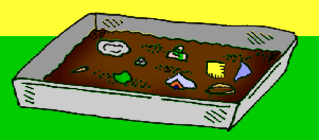
Earth Day – A Decomposable Experiment
[40 Minutes]
Earth Day began over 30 years ago in an effort to build a world wide appreciation for our planet. People started to conserve energy by driving slower, shutting off their lights more often, making compost piles, recycling newspapers, bottles and cans, and by trying to use more materials that will naturally decompose, to save our natural resources. Try this experiment and see how long it takes for everyday materials to break down and return to the earth.
You'll need:
• large disposable aluminum lasagna pan • soil • water • sample waste items--toothpick, tin can lid, a piece of aluminum foil, a piece of a plastic bottle, a piece of a magazine page, a piece of a newspaper page, a piece of cotton fabric, a piece of polyester fabric, a rubber band • paper • pencil
What to do:
- If possible, print out these directions. Read them through with your child before you begin.
- With your child, gather everything you’ll need.
- Invite your child to fill the lasagna pan with about one to two inches of soil.
- Together, place the samples of solid waste on top of the soil. Use small pieces of everything.
- Make a “map” of where your samples are placed on the soil.
- Let your child cover the items with another layer of soil about the same thickness as the first.
- Sprinkle enough water to wet the soil.
- Here’s the hard part; wait for about two weeks, making sure that a little bit of water is sprinkled on the soil each day so the soil stays moist.
- After the end of two weeks, working together, carefully remove the top layer of soil. Try not to disturb your sample items.
- Check the sample items. Record which items have started to break down and which ones look the same. You can then cover the items again and repeat the process two weeks later.
Let's Talk: Ideas to Explore Together.
- Which items do you think will break down first? List your sample items in order from the ones you predict will break down quickest to slowest?
- What items do you think will not break down at all? What are they made of?
- Looking at your findings at the end of two and four weeks, think about your family’s trash. How much is decomposable? How much is not?
|